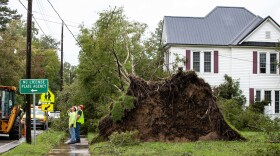State lawmakers have returned home following a hectic, six-week session during which they approved a state spending plan, continued an ongoing clash with the Governor, and for the most part, avoided any major controversy.The North Carolina General Assembly short session takes place in even-numbered years and is relatively new. Short sessions, with the primary function of adjusting the budget following a deficit or surplus, began in 1974. Prior to that the legislature had a regular session in odd-numbered years, with the occasional additional of an extra, or special, session.
This set of legislators is likely to return again this year, though possibly not until after the November election. So for now, a quick review of what your elected officials did – and did not do – since mid-May.
What They Did
Completed - or adjusted - the state’s budget for the fiscal year which began July 1st. This fiscal blueprint included overall growth of about 4 percent, average teacher raises of 6.5 percent, and modest increases of 2 percent for state employees. Republicans touted the pay bumps, and additional money for the state’s rainy day coffers, as further evidence of a strong economy. Democrats offered sharp criticism of a budget process that broke with decades of standing practice in not allowing the minority party to offer amendments to the plan. Governor Roy Cooper vetoed the spending plan, which the Republican supermajority swiftly voted to override.
Approved, preliminarily, six constitutional amendments to the North Carolina constitution. The fate of these proposed changes now rest with the voters. The six changes would require photo ID to vote in person, cap the state income tax at 7 percent (currently 10), move some appointment powers from the Executive to the Legislative branch, and establish a new board to vet and determine candidates for judicial vacancies. For context, the six proposed amendments on November’s ballot represent nearly as many (7) as have appeared at the election box during the last 20 years. The half dozen referendum questions are seen as a tool by the GOP to try to increase voter turnout, and also to create wedge issues that some Republican candidates are sure to use against Democratic opponents in campaign ads. Since the current state constitution was ratified in 1971, nearly 82 percent of proposed amendments (37 out of 45) have been approved by the voters.
Avoided major controversy. For a legislature that has garnered plenty of scathing national headlines in recent years, this is notable. Experienced political observers said going into the session that lawmakers would be best served to avoid extended contentious debate over topics such as firearms, abortion regulations, or transgender bathroom access. While lawmakers again changed election law (altering the early voting period), sought to restrict the power of the governor, and approved a charter school measure in Mecklenburg County that was dubbed “morally reprehensible”, things were, relatively speaking, quiet.
Placed new limitations on what recourse neighbors of farms can seek in the event of a so-called nuisances. The bill, which divided some factions of the Republican Party, largely boiled down to a debate over personal property rights, and protections for major corporations. The Farm Act places tougher restrictions on citizens wanting to sue over the nuisance – think smell – associated with hog farms. The controversial bill also bans producers of almond, coconut and soy from labeling their product as milk. This measure was one of 10 that the governor vetoes, eight of which were overridden by lawmakers.
What They Didn't Do
Arm teachers, or raise a red flag. Following the mass school shooting in Parkland, Fla., there were calls to enact legislation dealing with guns. One Republican lawmaker pushed a proposal seeking to arm teachers. One Democrat called for a gun violence restraining order, which would have removed firearms from people who demonstrated that they were a threat to others. But leaders in both chambers thought it wise not to poke the powerful gun lobby, or set off a contentious debate over firearms. Neither proposal got a hearing.
Provide more psychologists. Lawmakers did convene a school safety taskforce, which examined issues of mental health resources in public schools. However, efforts to change regulations to allow for the hiring of more school psychologists stalled out.
Entirely kill the prospects of light rail in the Triangle. Lawmakers left the door open, albeit narrowly, to the long talked about possibility of a light rail between Durham and Orange Counties.
Require disclosure of online campaign ads. A bipartisan proposal in the House sought to create greater transparency about who paid for political advertisements on social media. The measure was backed by Republican David Lewis and Democrat Pricey Harrison, who noted that online political advertising on Facebook had soared from $22 million a decade ago, to $1.4 billion in 2016. In the end there were questions from some about whether such a bill limits free speech, and how “boosting” a popular practice on Facebook would be handled.
Address the #metoo movement. In recent months, reports detailed sexual misconduct by currents and former state lawmakers, as well as a culture of chivalry. There were calls for an independent system to file complaints of sexual harassment, and for a sitting House member to resign. However, Duane Hall (D-Wake) stayed put, and no fundamental changes to reporting practices were implemented.





